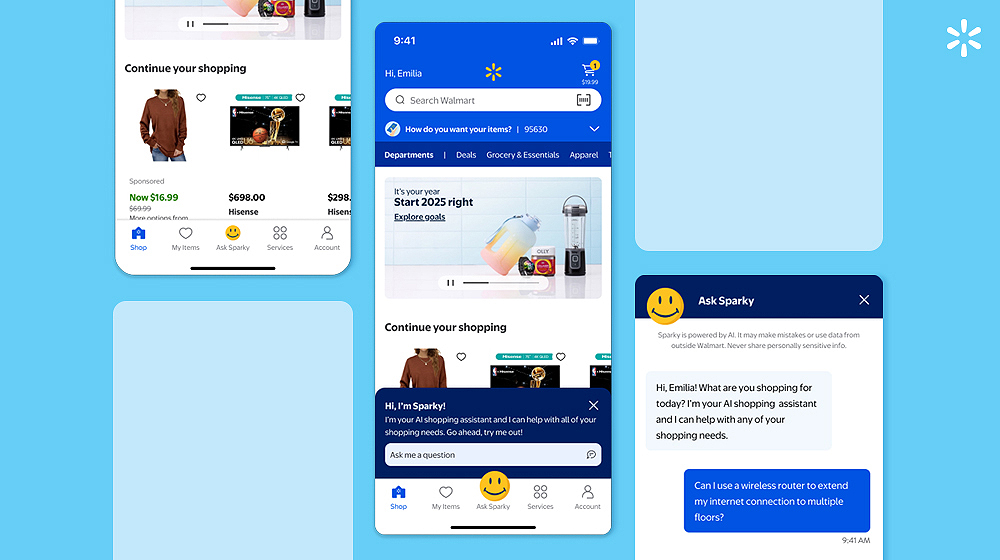The retail industry is undergoing one of the most significant transformations in its history. The rise of artificial intelligence agents (AI agents) is redefining how businesses interact with customers, optimize operations, and drive growth. While traditional automation and predictive AI have already created measurable impact, the shift toward agentic AI represents a substantial advancement: autonomous systems capable of analyzing data, making decisions, and executing actions in real time—without human intervention.
According to Salesforce research (2024), 32% of consumer goods companies have already implemented generative AI solutions in their digital operations. Analysts and industry leaders project that autonomous AI agents will become the next significant technological wave, reshaping physical stores and online platforms. This shift is about efficiency and creating intelligent retail ecosystems that continuously adapt to consumer demand and operational challenges.
What are AI Agents in Retail?
An AI agent in retail is an intelligent system designed to observe its environment, reason with data, make decisions, and take action to achieve a specific business goal in the field of retial. These agents may recommend products, manage inventory, optimize pricing, or redesign store layouts dynamically.
The distinction between AI agents and other AI applications lies in their autonomy and decision-making capabilities:
- Traditional automation: Executes predefined rules (e.g., sending automated emails).
- Predictive AI: Anticipates outcomes using historical data (e.g., forecasting demand).
- Generative AI: Produces new content (e.g., writing product descriptions or creating imagery).
- Agentic AI: Completes tasks end-to-end autonomously (e.g., reordering stock or adapting promotions in real time).
Unlike predictive or generative AI, agents do not stop at analysis or recommendation. They take action and adapt continuously, creating a closed decision-making loop where learning and execution are integrated directly into retail operations.
Key Applications In-Store and Online Retail
1. Customer Service and Personalization
- AI agents can be 24/7 customer support assistants, resolving queries across multiple channels.
- Virtual personal shoppers guide consumers through product discovery, recommending items based on preferences, history, and contextual behavior.
- Industry examples: Amazon’s Rufus and Walmart’s Sparky act as “super agents,” unifying customer interactions into seamless, intelligent experiences.
Additional Considerations: Beyond customer service, AI agents are increasingly capable of understanding emotions through sentiment analysis, allowing them to respond empathetically. Research by Accenture shows that 91% of consumers are more likely to shop with brands that provide relevant offers and personalized recommendations, highlighting the financial impact of personalization.
2. Inventory and Operations Management
- Real-time monitoring of stock levels with automated replenishment.
- Shelf management using computer vision to detect misplaced or low-stock items.
- Forecasting demand trends to minimize both stockouts and excess inventory, reducing waste, and optimizing warehouse logistics.
3. Dynamic Pricing and Promotions
- Continuous price optimization based on demand elasticity, competitor activity, and customer segmentation.
- Personalized promotions that increase conversion rates and improve loyalty.
Case Example: According to a Deloitte study, retailers using AI-driven pricing strategies increased profit margins by up to 10%. AI agents can identify optimal pricing strategies in real time.
4. Fraud Detection and Loss Prevention
- AI agents are being deployed in payment systems and loyalty platforms to detect anomalous activity in real time, reducing risks of fraud and chargebacks.
- They also monitor in-store transactions and returns to identify patterns of abuse.
Example: According to SymphonyAI, leading retailers have already cut fraudulent transactions by double-digit percentages by deploying AI-driven monitoring agents across POS systems.
Benefits of Including AI Agents in Retail
The implementation of AI agents delivers measurable value across multiple dimensions:
- Enhanced customer satisfaction: Personalization, seamless shopping experiences, and always-available service.
- Operational efficiency: Reduction in repetitive tasks, improved workforce productivity, and optimized logistics.
- Advanced business insights: Real-time analytics on sales, inventory, and customer behavior.
- Competitive edge: Bain Capital Ventures estimates that early adopters of AI agents will capture up to 73% of market share by 2030.
- Revenue growth: McKinsey (2022) projects that AI in retail could generate between $240–390 billion in additional value, primarily through improved margins and customer loyalty.
- Sustainability impact: By minimizing waste, optimizing delivery routes, and reducing excess inventory, AI agents contribute directly to lowering operational emissions.
Success Stories
Walmart: Unified Customer Experiences
Walmart launched Sparky, a conversational AI agent integrating multiple customer service channels. By consolidating fragmented support experiences, Walmart significantly increased customer satisfaction and operational efficiency.

Amazon: Intelligent Product Discovery
Amazon introduced Rufus, an advanced conversational agent to guide users through complex product discovery. Rufus leverages Amazon’s massive product database and customer behavior patterns to deliver real-time, tailored recommendations that increase conversions and basket size.

How to Integrate AI Agents into Your Retail Strategy
Adopting AI agents in retail requires careful planning and the right technological foundations. The following steps are essential for successful implementation:
- Unify Your Data: Ensure that CRM, POS, inventory, and e-commerce platforms are fully integrated to create a seamless data ecosystem.
- Prioritize High-Impact Use Cases: Begin with applications that deliver immediate ROI, such as customer service automation or real-time inventory management.
- Choose Scalable Platforms: Implement AI systems that can scale with your business needs, accommodating increased data volumes and expanded operational scope.
- Maintain Human Oversight: Keep humans in the decision-making loop, especially for high-stakes business processes such as pricing or supply chain management.
- Select the Right Partners: Collaborating with companies specializing in agentic AI architectures, like Digital Sense, ensures safe, efficient, and tailored deployment. With over 100 successful AI projects, a highly specialized team, and multiple innovation awards, Digital Sense is positioned to help retailers implement AI agents strategically and effectively.
- Invest in Change Management: AI agents reshape workflows. Training staff to collaborate with autonomous systems is crucial for adoption. Transparent communication reduces resistance and increases ROI.
- Measure and Optimize: Establish KPIs to track agent performance in customer service, inventory accuracy, or revenue growth. Iterative improvements ensure sustained business value.
Conclusion
AI Agents represent the next frontier in retail innovation. They are autonomous, adaptive, and capable of optimizing real-time customer interactions and internal processes. Retailers that adopt AI agents now will be positioned to achieve higher operational efficiency, stronger customer loyalty, and measurable revenue growth.
At Digital Sense, we specialize in helping retail businesses transition from siloed data systems to fully integrated AI-driven ecosystems. From data integration to scalable AI agent deployment, our team of experts delivers solutions that generate long-term impact.
Ready to transform your retail strategy with AI agents? Visit www.digitalsense.ai to learn more about our solutions, explore case studies, or discover out AI consulting services to get all the information you need.
References
- Deloitte (2022). Dynamic Pricing in Retail. Available at: https://www.deloitte.com/ce/en/services/consulting/services/dynamic-pricing.html
- SymphonyAI (2024). AI Agents in Retail Operations. Available at: https://www.symphonyai.com/resources/blog/retail-cpg/ai-agents-operations/
- Salesforce Research (2024). AI in Consumer Goods Report. Available at: https://www.salesforce.com/retail/retail-ai-agents/
- McKinsey & Company (2024). LLM to ROI: How to scale gen AI in retail. Available at: https://www.mckinsey.com/industries/retail/our-insights/llm-to-roi-how-to-scale-gen-ai-in-retail
- Walmart Corporate Newsroom (2024). Introducing Sparky, Walmart’s Conversational Agent. Available at: https://corporate.walmart.com/news/2025/06/06/walmart-the-future-of-shopping-is-agentic-meet-sparky
- Amazon News (2024). Rufus: AI-Powered Shopping Assistant. Available at: https://www.aboutamazon.com/news/retail/amazon-rufus
- Digital Sense (2025). Company Portfolio and Case Studies. Available at: www.digitalsense.ai.
- Financial Times (2025). AI Agents Moving from Copilots to Autopilots. Available at: https://www.ft.com/content/3e862e23-6e2c-4670-a68c-e204379fe01f
- Business Insider (2025). Mastercard AI Credit Card Fraud Detection. Available at: https://www.businessinsider.com/mastercard-ai-credit-card-fraud-detection-protects-consumers-2025-5
- Databricks Blog (2025). Five Areas Where AI Agents Will Transform Retail Industry. Available at: https://www.databricks.com/blog/five-areas-where-ai-agents-will-transform-retail-industry
- Forbes (2025). How Autonomous AI Shopping Agents Will Transform Retail. Available at: https://www.forbes.com/sites/kirimasters/2025/02/25/how-autonomous-ai-shopping-agents-will-transform-retail/
.jpg)

.jpg)
.png)
